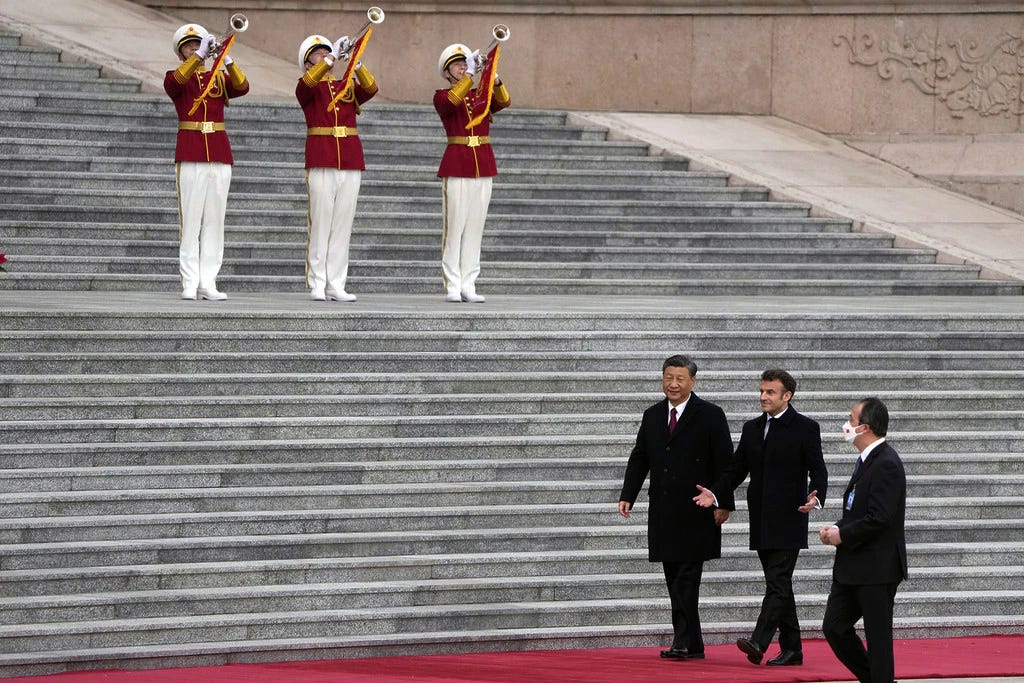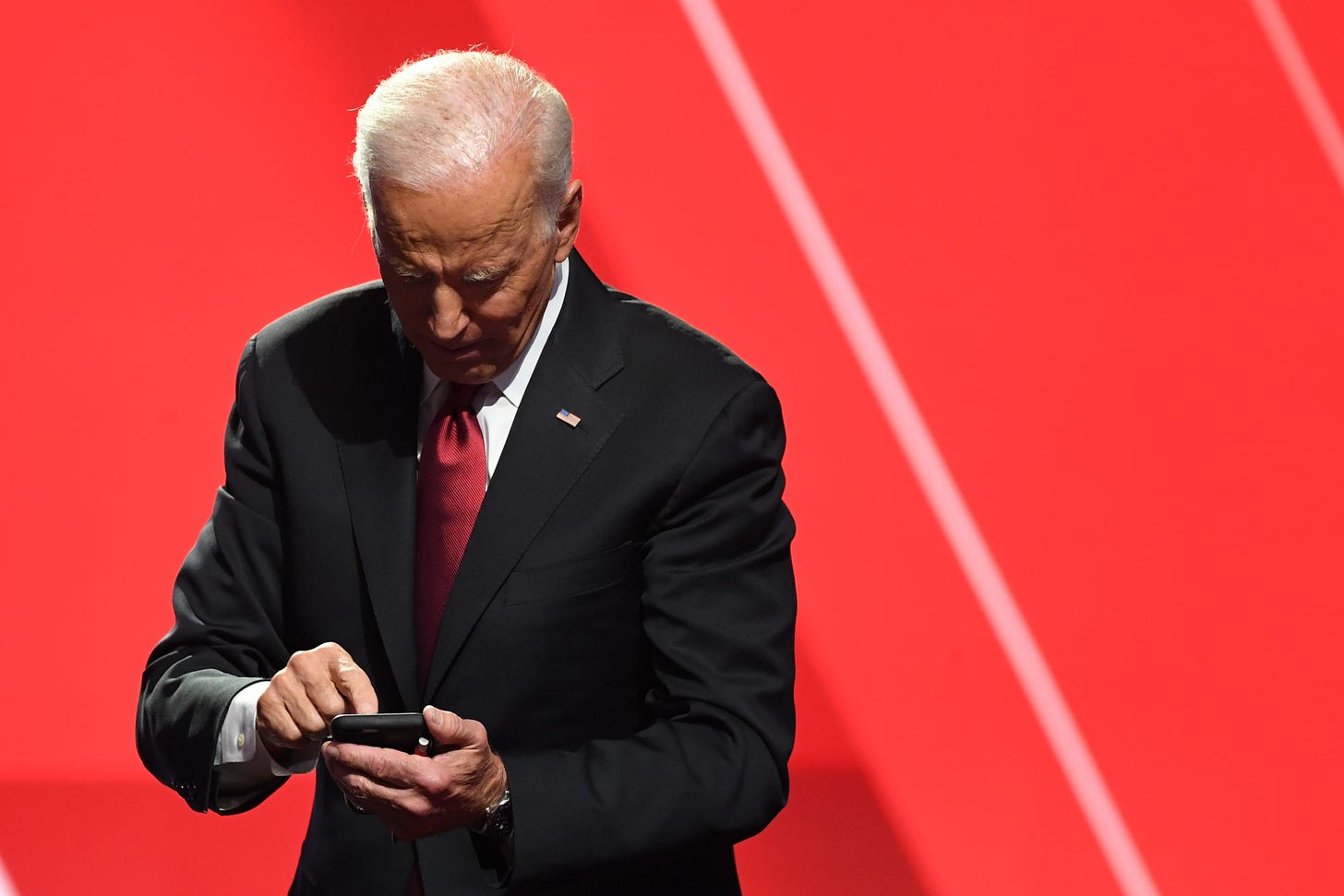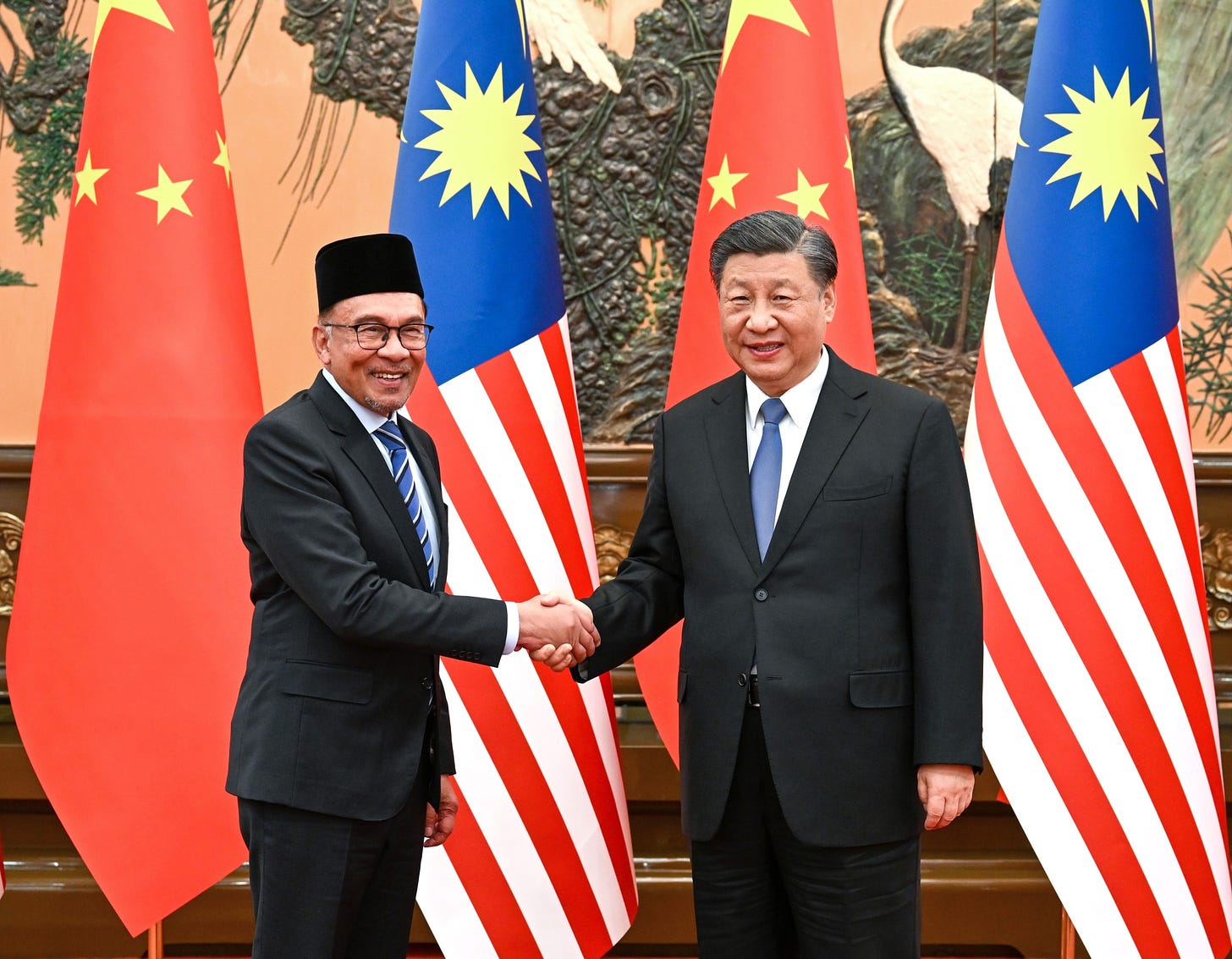你爱不爱我 Do You Love Me?
Red Carpet for Macron, von der Leyen see's red, Whitehouse phone out of order, US fears China cable, China loves AI, AI love and sex 我爱人工智能, big tech loves money, China-Malaysia ASEAN monetary fund.
UPDATE: French President Emmanuel Macron was given the full red-carpet treatment this week in Beijing. EU chief Ursula von der Leyen was mostly left alone.
Tsai In-wens transit in the US, which was longer than her visits to Guatemala and Belize, only confirm what every China watcher knows - the US is hellbent on salami slicing the One China Principle and pushing for Taiwan independence.
US fears Chinese state-owned telecom firms development of a RMB 3.4 Billion (US$500 million) undersea fibre-optic internet cable network that would link Asia, the Middle East and Europe.
Leading Chinese tech companies said on Thursday that they would not like to see a pause or slowdown in the game-changing GPT-4 technology, but instead vowed more efforts to develop responsible artificial intelligence to balance benefits and risks.
With rapid advances in AI technology over the past few years, norms may are evolving to include sex, love and friendships with AI-equipped machines.
Big techs are lending to small and medium-sized enterprises and vendors on their e-commerce platforms, thus encroaching on financial markets. By using machine learning and big data to generate credit scores, big techs can assess a company's creditworthiness more accurately than traditional credit bureau ratings can.
China is open to talks with Malaysia on forming an Asian Monetary Fund, said Prime Minister Anwar Ibrahim, reviving a decades old proposal to reduce reliance on the dollar.
Où se trouve von der Leyen?我以为她是和你在一起的!
French President Emmanuel Macron was given the full red-carpet treatment this week in Beijing, fêted at a state banquet, and greeted by military parades and firing cannons on Tiananmen Square. On the homepage of news agency Xinhua, much of the focus on Wednesday centred entirely around Macron and China’s ties with France, leaving the EU an almost invisible subject. French President Emmanuel Macron got parades and banquets. EU chief Ursula von der Leyen was mostly left alone.
When Macron’s plane landed, China’s foreign minister personally welcomed him. When European Commission President Ursula von der Leyen arrived, she got the ecology minister — at the regular passenger exit. While Macron’s schedule was overflowing, von der Leyen’s was bare-bones. While Macron was attending a lavish state banquet Thursday night with Chinese President Xi Jinping, von der Leyen was giving a sober press conference at the EU delegation’s own headquarters. While state media trumpeted the Sino-French relationship, Chinese social media demonized von der Leyen as an American puppet.
The distinction illustrates the difficulties Europe is having in dealing with China. The EU’s 27 members have an array of opinions about how to approach China. And in the case of Macron and von der Leyen, Beijing sees a greater chance to make headway with the French leader, rendering the EU executive to a somewhat subordinate position.
Macron’s decision to invite von der Leyen on the trip was intended as a display of European unity. The result was anything but. While Commission officials ahead of the trip had stressed that von der Leyen would follow a different schedule from the French president the result was an at times disjointed split screen.
Read more here.
Why won’t he answer my calls?
Tsai In-wens transit in the US, which was longer than her visits to Guatemala and Belize, only confirm what every China watcher knows - the US is hellbent on salami slicing the One China Principle and pushing for Taiwan independence. While the Tsai-McCarthy meeting was absent of the formal trappings of an “official” visit the announcement of more arms sales can only heighten tensions.
U.S. national security adviser Jake Sullivan told reporters last month that the White House was hoping to nail down a call following the March 13 closure of the annual meeting of China’s parliament. China’s Foreign Ministry responded by making clear that Beijing was in no hurry to reconnect the two leaders. “Communication should not be carried out for the sake of communication,” Foreign Ministry spokesperson Wang Wenbin told reporters. The White House needed to “show sincerity … to help bring China-U.S. relations back to the right track,” Wang said.
National Security Council spokesperson John Kirby refloated the U.S. desire for a Biden-Xi call a week later. Beijing hasn’t responded publicly. Kirby said Biden’s administration also wants to broker a visit to China by Treasury Secretary Janet Yellen and Commerce Secretary Gina Raimondo and get Blinken’s Beijing trip “back on the calendar.” China’s Commerce Ministry has said it “welcomes Secretary Yellen’s hope for a visit to China” and that it’s “open to Raimondo’s wish to visit,” but had yet to receive formal notification of Raimondo’s intentions. But the Chinese government hasn’t indicated any timetable for when Yellen, Raimondo or Blinken may travel to China.
The U.S. official and the former State Department official familiar with the issue confirmed that a Blinken visit and a Biden call with Xi have come up in the conversations with Chinese officials. There have been scattered interactions with top officials, but not enough to restore meaningful dialogue. Sullivan spoke with top Chinese diplomat Wang Yi last week, “and that is an important channel, but used sparingly” because of the sensitivities of such communications, the former State official noted. And overall communications will expand when China’s new ambassador in Washington, Xie Feng, is fully in place, the former official predicted.
Read more here.
Try calling on the other line!
Chinese state-owned telecom firms are developing a RMB 3.4 Billion (US$500 million) undersea fibre-optic internet cable network that would link Asia, the Middle East and Europe. China's three main carriers – China Telecommunications Corporation (China Telecom), China Mobile Limited and China United Network Communications Group Co Ltd(China Unicom) – are mapping out one of the world's most advanced and far-reaching subsea cable networks.
Known as EMA (Europe-Middle East-Asia), the new cable would link Hong Kong to China's island province of Hainan, before snaking its way to Singapore, Pakistan, Saudi Arabia, Egypt and France. The cable would be manufactured and laid by China's HMN Technologies Co Ltd, a fast-growing cable firm whose predecessor company was majority-owned by Chinese telecom giant Huawei Technologies Co Ltd.
HMN Tech, which is majority-owned by Shanghai-listed Hengtong Optic-Electric Co Ltd, would receive subsidies from the Chinese state to build the cable. News of the planned cable comes in the wake of the US government thwarting a number of Chinese undersea cable projects abroad over the past four years. Washington has also blocked licenses for planned private subsea cables that would have connected the United States with the Chinese territory of Hong Kong, including projects led by Google LLC, Meta Platforms, Inc and Amazon.com Inc.
Undersea cables carry more than 95% of all international internet traffic, but have become weapons of influence in an escalating effort by the United States to dominate the advanced technologies that could determine economic and military supremacy in the decades ahead.
The China-led EMA project is intended to directly rival another cable currently being constructed by US firm SubCom LLC, called SeaMeWe-6 (Southeast Asia-Middle East-Western Europe-6), which originally had included China Mobile, China Telecom, China Unicom. But a successful US government pressure campaign flipped the contract from HMN Tech to SubCom last year.
The US blitz included giving millions of dollars in training grants to foreign telecom firms in return for them choosing SubCom over HMN Tech. The US Commerce Department also slapped sanctions on HMN Tech in December 2021, alleging the company intended to acquire American technology to help modernize China's People's Liberation Army.
The new cable creates a super-fast new connection between Hong Kong, China and much of the rest of the world, something Washington wants to thwart. Secondly, it gives China's state-backed telecom carriers greater reach and protection in the event they are excluded from US-backed cables in the future. It is an early sign that global internet infrastructure, including cables, data centres and mobile phone networks, could become divided over the next decade.
Countries could also be forced to choose between using Chinese-approved internet equipment or US-backed networks, entrenching divisions across the world and making tools that fuel the global economy, like online banking and global-positioning satellite systems, slower and less reliable. The more the US and Chinese disengage from each other in the information technology domain, the more difficult it becomes to carry out global commerce and basic functions."
Read more here.
中国爱人工智能 - CHINA LOVES AI !
Leading Chinese tech companies said on Thursday that they would not like to see a pause or slowdown in the game-changing GPT-4 technology, but instead vowed more efforts to develop responsible artificial intelligence to balance benefits and risks. They made the comments after Tesla CEO Elon Musk and dozens of other tech executives called on AI labs to cease training models more powerful than GPT-4 — the latest version of the large language model software developed by US startup OpenAI.
"We are not willing to see a stop or slowdown of GPT-4 related technology. To be frank, once tech advances, there is no way to stop or reverse it," said Du Lan, senior vice-president of tech firm iFlytek, at the ongoing Boao Forum for Asia on Thursday.
But Du said that it is necessary to make good use of the technology, which is always a double-edged sword.
"More efforts should be made to develop AI that is safe, controllable and benefits human beings," she said.
Zhou Hongyi, founder of 360 Security Group, said via social media on Thursday that not developing (GPT-4 and related technology) in fact poses the greatest insecurity.
“China must catch up with the trend of GPT, as it will bring about a substantial increase in productivity, thereby enhancing a country's competitiveness […] Chinese companies are still around two years behind GPT-4's level of development. Therefore, it is too early to worry about the risks. China should develop its own large AI model”
As ChatGPT takes the tech world by storm, an array of Chinese tech companies including Alibaba Group Holding, iFlytek and NetEase are already on the way to developing similar models.
A group of AI experts, including Kai-Fu Lee, former head of Google China and CEO of Chinese investment firm Sinovation Ventures, along with Meituan co-founder Wang Huiwen, also launched new startups to develop competitors to ChatGPT.
Baidu Inc is one of the first Chinese companies to launch a potential ChatGPT competitor — Ernie Bot. Shen Dou, executive vice-president of Baidu, said at the Boao Forum on Thursday that Chinese companies should act as soon as possible instead of thinking too much.
"But more efforts are needed to rethink a company's own advantages and how to use AI to amplify this advantage," Shen said.
Shen emphasized that generative AI will create new occupations and he predicted that more than 50 percent of people will be "instructors" in the future to guide AI to perform tasks.
The latest data from International Data Corp predicts that China's AI spending will increase to $14.75 billion this year, accounting for about one-tenth of the global AI market.
Justin Yifu Lin, dean of the Institute of New Structural Economics at Peking University, said at the forum: "Instead of worrying about it, people should actively embrace technological change. Technological advancement may lead to fewer jobs but also give people more opportunities to enjoy life."
Read more here.
Sex, love and companionship … with AI?
With rapid advances in AI technology over the past few years, norms may are evolving to include sex, love and friendships with AI-equipped machines. People use technology to form and maintain relationships and bond with machines such as AI-equipped systems like Replika that essentially operate as advanced chatbots, along with physical robots like RealDollx or Sex Doll Genie.
Someone’s willingness to use sex robots is tied to sexual preferences and sensation seeking. Studies show that people find many uses for sexual and romantic machines outside of sex and romance. They can serve as companions or therapists, or as a hobby.
We are now in an age of what sociologist Elyakim Kislev calls “relationships 5.0” in which we are “moving from technologies used as tools controlling human surroundings and work to technologies that are our ecosystem in and of themselves.”
People who use “sextech,” or technology designed to enhance or improve human sexual experiences seem capable of forming deep attachments with AI systems. Take the app Replika. It’s been marketed as the “AI companion who cares” – a virtual boyfriend or girlfriend that promises to engage users in deeply personal conversations, including sexting and dirty talk.
If we have learned anything about the ways in which technology has already become integrated into our relationships, it is likely that sexual and romantic relationships with AI-equipped systems and robots will become more common in the not-so-distant future.
Read more here.
Big Tech Credit Channel
Big techs are lending to small and medium-sized enterprises and vendors on their e-commerce platforms, thus encroaching on financial markets. By using machine learning and big data to generate credit scores, big techs can assess a company's creditworthiness more accurately than traditional credit bureau ratings can. As a result, this may decrease the relevance of the "collateral channel" and, simultaneously, increase the responsiveness of credit to changes in firms' business conditions. Second, the threat of reputational damage, or of being excluded from the e-commerce platform, serves as an extra-legal but highly effective means of contract enforcement for big tech firms.
We view big tech credit through the lens of a model where big techs facilitate matching on the e-commerce platform and extend loans. While bank credit is backed by collateral, big techs reinforce credit repayment by threatening to exclude borrowers from the platform. The most significant difference between big tech credit and bank credit lies in the borrowers' cost of default. If a firm defaults on bank credit, it loses its collateral, usually real estate. In contrast, if a company defaults on big tech credit, it loses access to the e-commerce platform, thereby jeopardising future profits.
Download full article here.
Malaysia and China Discuss ‘Asian Fund’
Malaysia PM Anwar revives proposal for Asian Monetary Fund President Xi Jinping welcomes further talks, says Anwar. China is open to talks with Malaysia on forming an Asian Monetary Fund, said Prime Minister Anwar Ibrahim, reviving a decades old proposal to reduce reliance on the dollar. Anwar said he proposed setting up the fund at the Boao forum in Hainan last week, stressing the need to reduce reliance on the dollar or the International Monetary Fund.
“When I had a meeting with President Xi Jinping, he immediately said, ‘I refer to Anwar’s proposal on the Asian Monetary Fund’, and he welcomed discussions,” Anwar told the Malaysian parliament on Tuesday. Anwar was on a state visit to China last week to steer ties post-Covid.
“There is no reason for Malaysia to continue depending on the dollar,” he added. Malaysia’s central bank is already working on enabling the two nations to negotiate on trade matters using the ringgit and renminbi, said Anwar, who doubles as finance minister.
Anwar also revealed to lawmakers the breakdown of the record 170 billion ringgit (RMB 266 billion) investment China had committed to Malaysia. This includes an initial investment of 2 billion ringgit this year in Zhejiang Geely Holding Group and Proton’s automotive high-tech valley project, which will increase to 32 billion ringgit.
Rongsheng Petrochemical Co. will also increase their activities in Pengerang, Johor with an 80 billion ringgit project, Anwar said. Rongsheng is one of China’s biggest refiners.
Malaysia ready to negotiate with China in sea dispute
Prime Minister Anwar Ibrahim said Monday that Malaysia was prepared to negotiate the South China Sea dispute with Beijing to safeguard the country’s energy exploration efforts. Anwar, who was on a visit to Beijing recently, said the “sensitive” issue was raised at a meeting with Chinese President Xi Jinping as Malaysia’s state energy firm Petronas has its largest oil platform in the disputed area, as well as several exploration projects.
“I said, as a small country we need the resources, (like) oil and gas, we have to continue exploration projects […] but if the condition is that there must be negotiations, then we are ready to negotiate.”
The premier did not provide further details on the conversation with President Xi Jinping.
Read more here.










